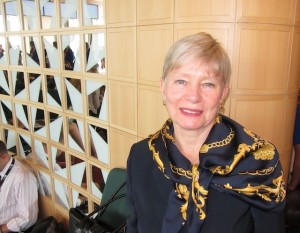The US Department of Education has released its first ever “fully articulated” international education strategy in a bid to build a more globally savvy country. However, some educators argue it lacks detail, firm policy commitments, and funding to mitigate a 40% cut to spending on international programmes in 2011.
News and business analysis for Professionals in International Education
Have some pie!
US international strategy short on detail
Succeeding Globally Through International Education and Engagement sets out two key priorities: to strengthen US education and “advance the nation’s international priorities” over the next four years.
Practically this means tackling a growing need for “global skills and awareness”—vital for US students to compete with their international peers in a globalised economy; improving trade; addressing world problems such as climate change; and improving national security through education as “soft diplomacy”.
“Whereas it certainly falls short on specifics it takes an important first step that will hopefully lead to a fruitful debate”
US educators have been crying out for policy intervention in this area but any new ideas are conspicuous by their absence in the strategy.
On its key objective to improve “global competencies” among US students, the DoE calls for, among other things, more foreign language learning – an area likely to be scaled back through the cuts – and says only that it is looking at new ways to leverage existing programmes.

Patti Peterson, the American Council on Education’s presidential advisor on internationalisation and global engagement supports the strategy but wants more detail
It also says young people should develop their “knowledge about the world” through the study of subjects such as geography and the arts, but again offers no incentives.
Another goal is to advance “education diplomacy” – the means by where “relationships with government officials, policymakers, researchers, educators, students, and other professionals help further “global stability and progress”.
As part of this the DoE encourages mobility – flagging the 100,000 Strong Initiative to increase Sino-US student exchange – bilateral agreements, and participation in multilateral organisations such as Asia-Pacific Economic Cooperation (APEC).
However, little is said about immigration reform to retain skilled foreign students in the US – something supported by the Obama administration and New York Mayor Michael Bloomberg, but blocked by Congress. Nor is any new funding proffered, glaring given the $50 million cut to international education programmes under Title IV and the Fulbright-Hays Program in 2011/12.
“For their strategy to be successful, it needs to be holistic and include visa and funding reform,” Bill Colvin, director of pathways at Kings Colleges USA, told The PIE News.
While broadly supportive, Patti Peterson, American Council on Education’s presidential advisor on internationalisation and global engagement, told University World News: “The real question will be: How do you take these broad directional statements and fashion them into something that is truly supportive at all levels of higher education?”
Greater government recognition of international education will be welcomed by the sector
At least symbolically, greater government recognition of international education will be welcomed by the sector. Despite being the world’s number one study destination, the US lost 5% of the international student market during the last decade, with inertia over international education policy said to be a driving factor.
Peterson said that the introduction of a strategy was itself an important step forward. Colvin agrees: “Whereas it certainly falls short on specifics it takes an important first step that will hopefully lead to a fruitful debate. My hope is that this will create some transparency on it’s stance and usher in more consistency across the many departments and agencies that shape international education policy.”
Still looking? Find by category:



9 Responses to US international strategy short on detail